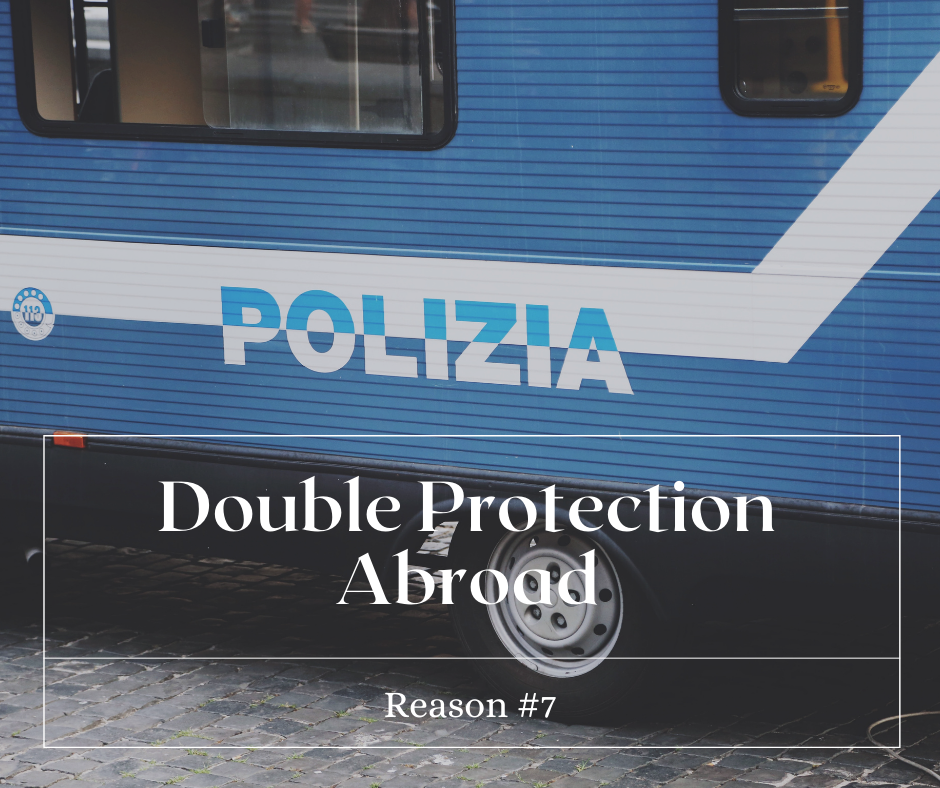
Claiming your Italian dual citizenship can be a long and daunting process. Gathering vital records, translations, and legalizations can be intimidating, not to mention showing up for a citizenship appointment at the Italian consulate.
But I promise you: Italian dual citizenship is well worth it, especially if you seek professional assistance during the process to ease the bumps in the road.
In this post, we’ll go over 10 amazing benefits of Italian dual citizenship. Hopefully, we can put the “Is Italian dual citizenship worth it?” question to bed once and for all… and convince you to get your shiny, new passaporto!
Getting started – before the benefits of Italian dual citizenship, let’s talk about the basics
An Italian passport is an incredible asset. It opens doors not only to the European Union but also to the world at large. In these turbulent times, European citizenship is an excellent resource to have “just in case.” People know this and are willing to work for it. In fact, those who don’t qualify for Italian citizenship by descent often resort to paying hundreds of thousands of dollars to buy their way into European citizenship by investment. We’ll publish a post on citizenship by investment soon.
But as a qualified Italian descendant, you don’t have to spend hundreds of thousands of dollars to get a European passport. You simply have to prove you are eligible. This involves providing various vital records to recreate your family tree, then handing it all in to the Italian government. While this is a simplification, that’s the gist of how it works. In the grand scheme of things, Italian citizenship is one of the more easy European ones to obtain–as long as you qualify.
That’s why some think it is unfair for people to get an Italian passport without ever living in Italy. Others think that you shouldn’t become Italian citizens if you can’t read or write Italian. Some want to limit the number of generations one can go back to claim Italian citizenship. We’re not here to get into the politics of Italian citizenship by descent, and so this is a discussion we won’t touch.
But we will say this:
If you qualify, Italian dual citizenship is your birthright. In fact, you’ve been an Italian citizen since birth – you just didn’t know it. As such, you’re technically not applying for citizenship at all. Rather, you’re seeking legal recognition of a status you already hold. Make no mistake, if you’re eligible for Italian citizenship then you’re already a citizen. Your citizenship is just lying there dormant waiting to be activated, so to speak.
Now that we’ve gotten that out of the way, let’s get to the issue at hand: the benefits of Italian dual citizenship.
What are the benefits of Italian dual citizenship?
As an Italian citizen, you’re a citizen of the European Union. There is no difference between your citizenship and that of a natural-born Italian citizen. While cost of obtaining dual citizenship can vary slightly depending on each family history, the benefits far outweigh any money spent.
Additionally, once you successfully obtain recognition of Italian citizenship it can almost never be taken away. What’s more, you can pass it on from generation to generation so everyone in your family can enjoy these benefits.

You Can Live and Work Anywhere in the European Union
Italians are citizens of the European Union.
This means that an Italian passport allows you to live anywhere in the European Union without restriction and without justifying your presence. The same goes for working.
If you have always dreamed of living in Italy (or Spain, or France, or Germany, or… so on), congratulations! You can now do so. Gone are the days of having to leave Europe after a 90 day stay, packing your bags to return home as you wistfully gaze out your hotel window counting the days until you come back. With an Italian passport, you never have to leave the European Union again if you don’t want to.
Just imagine yourself spending summer in Capri and winter in the Alps. What about living and working as a digital nomad between Sweden, Finland, and Denmark? Or opening up your own boutique in Florence. Or… well, you get it. The possibilities for living in Europe are endless once you have an Italian passport. The only thing stopping you is your imagination.

Employers Are More Likely to Hire You
Have you ever wanted to work for a European employer but felt out of the running before even applying? Or, are you wondering how you will stand out to employers who have their pick of choice applicants?
With an Italian passport you become a much more attractive potential employee.
In the first scenario above, most employers in Europe will bin a resume from a prospective employee who needs sponsorship. As a single-citizenship American, you can bet on an uphill battle for getting hired in Europe. This is not the case for Italian citizens. Once you have your Italian citizenship, potential employers no longer need to sponsor you and there is a refreshing lack of red tape. You’re ready to be hired as-is.
But what if you’re not ready to move to Europe and are still looking for positions in the United States? Here, too, an Italian passport can help. By disclosing this information to your employer, your application is sure to stand out among the rest. Doubly so if the employer has offices abroad–you just may be their “go to” person for matters facing their offices in Europe.
With your Italian passport you’re seen as a more well-rounded, attractive candidate.

Never Go Bankrupt Just for Getting Sick
This one is a big deal and in our opinion ranks high among the benefits of Italian dual citizenship.
If you are retirement age, the quality and cost of healthcare is a huge factor in deciding where to spend your golden years. Even for younger individuals and families, the local healthcare landscape can be the reason for putting down roots somewhere.
Time and time again the Italian healthcare system has been called one of the world’s best. In fact, the World Health Organization (WHO) ranked the Italian healthcare system second best in the world in 2020. This rating is based on health statistics like life expectancy and equal access to medical care. And – get this – Italy is also the second healthiest country in the world, as ranked by the Bloomberg Global Health Index.
All this to say that you are in great hands when it comes to healthcare in Italy. Even if you use your Italian citizenship to live elsewhere in Europe, European healthcare on the whole ranks higher on almost every metric than its American counterpart. When it comes to long-term outcomes, treatment outcomes, hospital-related care, and patient safety, European healthcare systems consistently rank better.
Finally, you will never go bankrupt from healthcare costs in Europe. Specifically in Italy, healthcare is subsidized by the state and income tax, leaving you without a bill when you visit the doctor.

Send the Kids (or Yourself) to School without Student Loan Debt
Many people consider this to be one of the best benefits of Italian dual citizenship. Access to formal education in Europe is far more democratic than the United States. Higher education is at the reach of almost all who want it. As a European citizen, you or your child can obtain a degree at rates which wouldn’t even cover the cost college textbooks in the U.S. As more European colleges add programs held entirely in English, it might be a good idea to consider getting your degree outside the United States.
According to U.S. News Data, the average student loan debt for recent college graduates is nearly $30,000, according to U.S News data. Compare this with average tuition rates for European citizens across the EU below:
[su_table]
| Austria | In Austria, tuition is free for European citizens. |
| Belgium | Around €906 (~US$1,060) per year for European citizens. |
| Denmark | Free for home/EU students at all levels. |
| Finland | Free for EU/EEA students. |
| France | €170 for for most undergraduate programs at public universities; €243 for most master’s programs, and €380 for doctoral programs. |
| Germany | Free for all students at undergraduate and PhD level at public universities. |
| Ireland | Free for EU/EEA students at undergraduate level (with a fee of €3,000 for student services). |
| Italy | €950-1000 (~US$920-1,100) at undergraduate level at public universities; €1,500 (~US$1,750) at postgraduate level per semester. |
| Norway | Free for all at public universities (with a few exceptions in the case of specialized programs). |
| Spain | €750-€2,100 (~US$880-2,450) at undergraduate level in public universities; €1,320-€4,320 (~US$1,540-5,050) at postgraduate level. |
| Sweden | Free for home/EU students at all levels. |
| Switzerland | CHF 805-1,238 (~US$810-1,245) per year at all study levels. |
| The Netherlands | €1,030 for EU students and those from Norway, Switzerland, Iceland, Liechtenstein, or Suriname at undergraduate level, €2,060 for most other courses. |
[/su_table]
Yes, Your Spouse Can Be Italian, too
If you’re a man married to a woman before April 27, 1983, your wife automatically becomes an Italian citizen when you do.
If you fall under any other category, your spouse is still eligible for Italian citizenship through a slightly more complex process. Once you’ve been married for at least 3 years (2 if living in Italy) and have your own citizenship recognized, your spouse may apply for naturalization as an Italian citizen as well.
These wait times are halved if you have children under 18.

Double the Citizenship, Double the Protection
When you are a dual citizen abroad you can seek help from two consulates, the United States and Italy. If you are in a country with no Italian diplomatic representation, you can actually seek help from any European consulate or embassy.
As an EU citizen while traveling in any EU country, you’re also guaranteed protection by The European Convention on Human Rights. The ECHR is a series of laws and guidelines pertaining to the human rights of people in countries belonging to the Council of Europe.
All member states of the European Union strictly enforce the Universal Declaration of Human Rights designed to protect EU citizens within their borders. What’s more, you’re also protected by privacy rights as drafted by the General Data Protection Regulation (GDPR) on May 25, 2018, designed to protect individuals’ personal information.
But wait… there’s more!
So many Italians left Italy not because they wanted to, but because they had to. When our ancestors left, they did so because they wanted to provide future generations with a better life. It didn’t mean they hated Italy or didn’t have strong ties to their heritage. On the contrary, many Italian Americans maintain the traditions brought over by their parents, grandparents, and beyond.
While many of our clients do contact us for the tangible benefits of Italian dual citizenship, it’s also about so much more.
Becoming an Italian citizen means coming full circle. It means fully restoring the ties to your heritage and ancestors that time and space have frayed. Those who recognize their Italian citizenship get to experience all the best things about Italy firsthand. They can relive their own history and see for their own eyes what life may have been like for their ancestors. They can have what they carry in their hearts–Italian heritage–legally recognized once and for all.
Here are a few more benefits of Italian dual citizenship:
You can pass it on to your kids (and grandkids) forever
One of the hallmark benefits of Italian dual citizenship is that it lasts forever. Once the claim is recognized, it’s fairly easy to keep the Italian citizenship passed down from one generation to the next.
If you file your application when your children are under 18, they automatically get recognized along with you. If your children are above 18, then your recognition makes it easier for them to become Italian citizens later on in the future. In such cases, you become the Italian ancestor up to which they must provide documentation (as opposed to the original Italian-born ancestor).
Italian citizenship can be passed down from generation to generation, forever and without limits.
If you want to renounce your U.S. citizenship, you won’t be stateless
According to U.S. news, a record number of Americans are renouncing their citizenship yearly. This occurs for a number of reasons. American expats (even those who’ve lived abroad for decades) who earn no U.S. income and own no U.S. assets must submit annual income tax returns; the punishment for noncompliance is severe. Additionally, the passing in 2010 of the Foreign Account Tax Compliance Act requires foreign financial institutions to report assets held abroad by U.S. citizens and green card holders. This is a major burden for many expatriates.
Would you like to become an Italian dual citizen? Get started today with our free, no obligation case evaluation! E-mail us to discuss the details of your case today.

